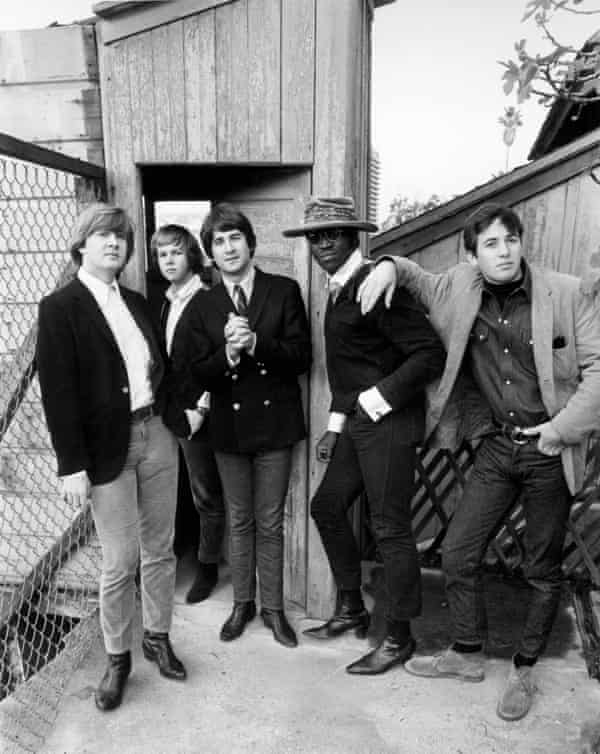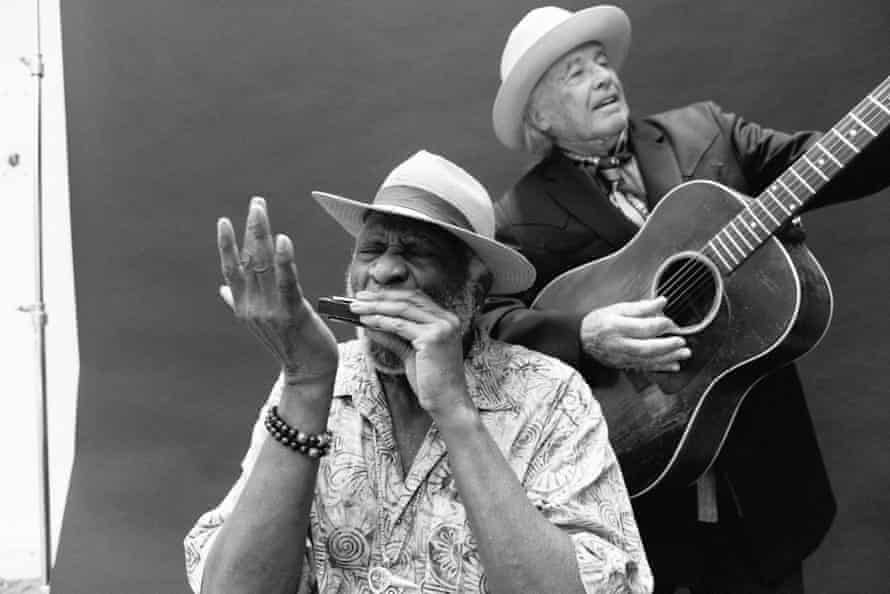Ry Cooder was just 14 when he first saw Sonny Terry and Brownie McGhee playing live. “Just their walk to the stage was unbelievably dramatic,” he remembers. The harmonica and guitar-playing folk-blues duo were appearing at a small club in West Hollywood called the Ash Grove. “They came through the audience,” Cooder says, “and Brownie was walking with difficulty, with a built-up shoe, having had polio. And Sonny was hanging on to him, because he was blind. When you are that age everything you encounter – at least for me, in music – is a tremendous revelation. Particularly if you come from Santa Monica – a wasteland of nothingness!”
Three years later Cooder would be on the same stage, playing guitar in a blues band, the Rising Sons, that included Taj Mahal, a young singer and multi-instrumentalist who shared his tastes. They recorded an album that was rejected by the record company, but eventually appeared in 1992, by which time Cooder and Mahal were big stars. Ry had become a session musician for Neil Young, Captain Beefheart and more, then a versatile guitar hero under his own name, exploring a wide range of American and global styles (he would later travel to Havana to play a crucial role in the success of the Buena Vista Social Club), while Mahal had his own successful solo career. Both became cult heroes for re-working the blues, both worked with the Rolling Stones, both have recorded exquisite albums with Malian stars, and have earned eight Grammys between them.

Now, with Cooder aged 75 and Mahal nearly 80, they have recorded their first album together in 56 years – a tribute to Cooder’s early heroes that has the same title, a similar cover, but not quite the same track list, as an album that Sonny Terry and Brownie McGhee released in 1952 on which they were joined by Coyal McMahan on maracas and billed as the Folkmasters. His early heroes were an unusual duo. Celebrities on the New York folk scene in the 1940s, when they worked with Lead Belly, Woody Guthrie and Pete Seeger, they went on to appear in Broadway productions and films, and for decades were regulars at blues festivals in the US and UK. They were deservedly successful but never fashionable, being considered too commercial by those blues fans who preferred the “authentic” styles of Skip James or Bukka White, who had been rediscovered and encouraged back on to the stage. “You couldn’t say that Sonny and Brownie were ever popular in the black communities,” says Cooder, “but they figured out: ‘What do white people like? Whatever they like, we’re going to do it.’”
Cooder and Mahal’s album demonstrates Sonny and Brownie’s range. There are folk standards originally learned from Lead Belly and Guthrie – The Midnight Special, Pick a Bale of Cotton, and I Shall Not Be Moved – and then there are blues, ranging from the upbeat Drinkin’ Wine Spo-Dee-O-Dee (written by McGhee’s brother Stick McGhee) to a slide-guitar-backed Pawn Shop Blues. Cooder sang and played guitar, mandolin and banjo, Mahal sang and played harmonica, guitar and piano, while Cooder’s son Joachim (in whose house the recordings were made) added percussion and bass. Aside from a few overdubs, each song was done in “just one take, with live vocals”, says Cooder.
The album is a celebration: of Sonny and Brownie, of Cooder’s long-awaited reunion with Mahal, and of the era back in the 1950s and early 1960s when young, mostly white Americans were excitedly discovering the blues. During my phone chat with Cooder in California he stresses how this music changed his life. “I couldn’t concentrate because I kept thinking about songs,” he says. “I got in trouble with teachers and all that crap.” Mahal was captivated by this music, too: “I was never about what everybody else liked – I was lucky enough as a young black man to realise the value of these people, these elders.”
Cooder’s fascination with folk and blues began when he was “five or six years old, just a little kid, not even in the first grade”. His mother had been in the Communist party and one of her friends was a violinist who had been blacklisted in the McCarthy era. “He had these records by Lead Belly – the original 78s. I’d go over – they were neighbours – and listen on their record player. And, as you say, the door opened! It was so fascinating and alluring. And the same man gave me a little guitar and said ‘you can learn to do this’ … and that’s how I got started”.
His parents were less understanding. His mother had met Woody Guthrie and complained “he was very dirty, he hadn’t even bathed”, to which the young Cooder replied: “Sure – because he hobo-ed on trains. What do you expect?” His family were “stone broke” and his father, who liked classical music, “used to say ‘these players you like are just poor field hands. They don’t have a pot to piss in or a window to throw it out of’. But I never considered that these people were poor – quite the opposite.”
He learned about music at the record store where he bought Sonny and Brownie’s Get On Board. It was “way downtown in Los Angeles, where you could buy these Folkways LPs. Whatever I saw, I would get, if it was New Orleans jazz, blues, hillbilly music – so long as it had that look, with black and white photographs, and text on the cover, I was fascinated by that. It was like a whole education, right there in front of you for $5.98. And I’d say: I’m going to memorise everything on this record, I’m going to learn the tunes and lyrics and try to play along on the guitar”.
Then he would watch his heroes playing at the Ash Grove, “where I would always sit at the counter, maybe eight feet from the stage … for someone like me trying to learn guitar, you want to really pay attention”. When Brownie McGhee was playing, he would ask: “How did that bass run go, how did you do that? And he’d say, ‘well, look here, kid’ and he’d play it. When you get to see these people in person, that’s when you learn something.”
Across the country, in Springfield, Massachusetts, Henry Saint Claire Fredericks, who would become internationally known as Taj Mahal, had first become fascinated by the country blues after hearing the playing of “my nextdoor neighbour who came from Mississippi and was one of my first guitar teachers”. Mahal’s Jamaican father had been a musician, but it wasn’t until he went to Amherst, where he earned a degree in agriculture and animal husbandry, that he became involved in the “coffee house, folk music” scene, and got to hear more country blues. He was aware of Sonny and Brownie’s Get On Board, “but it didn’t come to me the way it came to Ry – it was special for him”, and the first version of The Midnight Special he heard was by Lonnie Donegan. As for Lead Belly, he never heard him until he worked on a dairy farm “and a guy called Pete who was testing the milk said he collected his records”.

Mahal played in different bands, and worked with a guitarist, Jesse Lee Kincaid, who knew Cooder. In 1965, the pair travelled to Los Angeles “specifically to meet Ry Cooder – and with the hope of forming a group with him”. They got on well, Cooder says. “He and I seemed to like exactly the same things, and have the same kind of interest in the old music”. They formed the Rising Sons, a guitar, bass and drums band reworking songs like Blind Willie McTell’s Statesboro Blues or Jimmy Reed’s Baby What You Want Me To Do. Mahal remembers: “We were booked by the Martin guitar company to play at a teenage fair, demonstrating electric guitars. Ry played bottleneck and I played harmonica and second guitar. We saw it as great music.” They played at the Ash Grove, acquired a local following, and were signed by Colombia Records. So why was the album not released? “You have to convince these [record label] people, and it’s like convincing a stone obelisk to speak!” says Mahal. Cooder remembers: “The Byrds came out with Mr Tambourine Man, and all of a sudden, everyone was showing up in their Spandex pants and little sunglasses like Jim McGuinn wore.” Singer-songwriters were in fashion, and “me and Taj liked the old songs. But I don’t look back. The past is immaterial”.
Prior to their new album, they had only played together once since the Rising Sons – at a 2014 show in Nashville when Mahal won an Americana Music Award – and they are clearly enjoying their reunion. Asked if Cooder had changed, Mahal says: “Everything about him when I first came to California in 1965 was just amplified by time and accomplishment. There just aren’t people like that. It’s like talking about the Dalai Lama.” Cooder is more down to earth. “Me and Taj are old-timers now. We’re just old cats who want to have a good time together.”
Stay connected with us on social media platform for instant update click here to join our Twitter, & Facebook
We are now on Telegram. Click here to join our channel (@TechiUpdate) and stay updated with the latest Technology headlines.
For all the latest Music News Click Here
